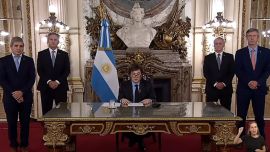Let me introduce you to Dr Hale. Descended from the family of American Revolutionary War patriot Nathan “I only regret that I have but one life to lose for my country” Hale, he teaches economics at some obscure New England college. Some time in mid-2016 he spent a few weeks here doing some research into the Argentine economy, which included picking my brains as the then-economic columnist of the late Buenos Aires Herald.
Try as I might (not that I have tried very hard), I've been unable to winkle a first name out of him except that he assures me that it is not Nathan — I can only conclude that he shares the Inspector Morse syndrome of having some impossible Biblical or Quaker name too embarrassing to reveal (or perhaps it is Nathan). So for this space he will forever be simply Dr Hale.
Anyway, late last year he sent me the following email:
“Hi, Michael. I've now been some months out of your country and I just cannot get the Argentine economy with all its conundrums and paradoxes out of my skull. Paul Samuelson (or was it Simon Kuznets?) was smack on when he said that there are four categories of country in the world: the developed, the underdeveloped, Japan and Argentina (implying that the first has made everything out of nothing and the other nothing out of everything). I’m obsessed, I’m an addict, I just have to know more. o my hope is that we can communicate on a regular basis and that you’ll answer my questions about the Argentine economy, which I follow as closely as I can at this distance.
My reply:
“Fine, Dr Hale, I’ll do my best but why me? You can find umpteen economic opinions much sharper and better-informed than mine. I’m not even an eco omist although I did specialise in economic history in my university studies.”
DH: “At least three reasons. Firstly, I’ve actually met you and call me old-fashloned if you like but I do like to preserve some face-to-face culture within today's technology. Secondly, you speak what Trump supporters might call a white man’s language, unlike most of Argentina — sure, many of your economists know English but with you it’s the native tongue and that makes me trust you more, see? Thirdly, and here I must be brutally frank, y ou gave me some interesting insights when I consulted you but you really do not have the credentials to be charging me any money, do you?”
Since then we have been exchanging emails with some regularity. This column will follow this series, also running previous exchanges on occasion when they become topical again within a circular cycle. Below follows the most recent interchange:
DH: “I see that last week they held the Council of the Americas talk fest in that swanky Frenchie downtown hotel which calls itself a palace. I’d love to have come but paying for a flight down the hemisphere (you guys really need to speed up the low-cost airlines) plus the US$250 attendance fee they were charging goes way beyond my budget. I followed it as closely as I could and bviously there are any number of talking-points but I’d like to pick up one in particular. Production Minister Francisco Cabrera described the agreement between Mercosur and the European Union as important not for increasing trade but investment. Everybody welcomes capital inflow (where would the US economy be without Chinese Treasury input and Dutch investment, for example?) but when you can only look at even a free trade agreement in terms of investment, that’s sick. What’s with you people? I come down here expecting plenty of gaucho machismo and instead I find a bunch of Blanche Dubois whining or the kindness of strangers.
Me: “I know exactly what you mean. In over three decades of journalism here I’ve covered dozens of trade missions and wearied of the countless times my fellow-reporters would totally ignore the commercial agenda to ask: How much are you going to invest?
“There are so many ways of answering your question. One simple but very basic explanation would be that domestic investment equire local savings and these in turn require a national currency, something Argentina has been lacking for decades. A traditional view perhaps since those are the most basic building-blocks of modern capital markets but the intermediate ones are also missing — things like mortgages, pension funds and credit in general, all of which account for much higher percentages of other Latin American economies, never mind the developed world.
“So there is definitely a demand for overseas investment to fill this vacuum and the local mentality is neatly expressed by Eva Perón’s phrase: ‘Where there’s a need, there’s a right’ — if investment is necessary, then it must be posible and even somehow inevitable.
“But it doesn’t work that way. Just as it is the employer who employs even though it is the applicant who needs the job, so it’s the investor’s call where they place their money.
“Profit is the bottom line for investors but far from the only factor. We have already discussed the famous “Argentine cost” in previous emails and will doubtless do so again in the future — nor will I bore you with such set phrases as ‘groundrules’ and ‘level playing-fields’ which are never missing from this debate.
“In Argentina’s case I also think a new national brand and model would be useful for attracting investors alongside all the cost-benefit ratios. This would not normally be important in today’s world where offering a strategic link in global value chains far outweighs the size or quality of the national market but Argentina has a negative image which it needs to live down.
“This rebranding would include shifting away from such political and economic paradigms as populism and protectionism — it would also include a new product mix but rather more than that. To find that model looking back into the past or elsewhere around the world can only go so far — it’s very much “caminante no hay camino” but perhaps we can explore that more next time if nothing else comes up.”
* He first entered the Buenos Aires Herald in 1983, held various editorial posts at the newspaper from 1990 and was the lead writer of the publication’s editorials from 1987 until 2017.
related news
by Michael Soltys





















Comments